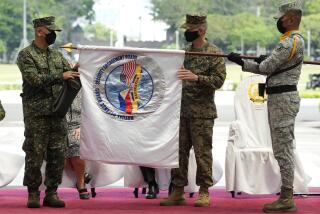Philippines Vote Perils U.S. Bases : Far East: Preliminary action by Senate in Manila would close strategic Subic Bay Naval Base. The U.S. says it won’t offer more money and is ready to leave.
WASHINGTON — Members of the Philippine Senate cast a preliminary vote Monday to reject a new bases deal with the United States, raising the possibility that the 93-year U.S. military presence in the country will end when the current agreement expires next week.
Bush Administration officials hope that Philippine President Corazon Aquino--who came to power with U.S. backing five years ago and was kept in office when American warplanes thwarted a 1989 coup against her--can win over some of the senators in the days before the final vote. She favors approval of a new bases agreement with the United States.
Aquino is scheduled to lead a “people’s power” march to the Philippine Senate in Manila today. U.S. officials believe that a massive rally may show the legislators that key constituencies--such as members of the Roman Catholic Church and residents of central Luzon island, which is economically dependent on the bases--want the Americans to stay.
But President Bush and other U.S. officials went out of their way to emphasize that, if the Philippine Senate casts a final vote against the proposed deal, the United States will pull its troops out of the country instead of offering more money for the bases.
Indeed, Secretary of Defense Dick Cheney announced Monday that the Defense Department is ready and willing to leave the Philippines.
“We won’t have any other choice,” Cheney said. “We won’t stay where we’re not wanted, and if they want us out, we’re--we’re gone.”
Not long ago, Pentagon officials would have been frantic over the prospect of losing Clark Air Base and Subic Bay Naval Base, which are strategically located in Southeast Asia along the sea lanes from the Pacific to the Indian Ocean.
But for the past five years, the United States has been working on contingency plans for a possible withdrawal from the Philippines, and American officials say that the bases there are now less important to defense strategy than in the past.
Clark Air Base has been partly shut down by the eruption of Mt. Pinatubo and is scheduled to be closed altogether on Sept. 16, 1992.
“We’ve made our best offer,” Bush said Monday morning. “While we don’t know how it will come out, there will be no change on the part of the United States.”
Another senior U.S. official involved in the negotiations over the large air and naval bases and some other small U.S. military facilities scattered in the Philippines took an even tougher line. Referring to the sums that the United States has already promised to the Philippines, he said, “A lot of people want that money.”
He added that Secretary of State James A. Baker III “will be visiting a couple of suitors in the next few days.”
Baker arrives in Moscow today and will be meeting with leaders of the Soviet republics and the Baltic states.
Under the deal concluded by the Bush Administration and Aquino’s government in July, the United States would pay the Philippines $323 million in the fiscal year that begins in October. The Administration also agreed to clean up Clark Air Base before it is returned.
In addition, the Administration promised to pay the Philippines $203 million a year for the succeeding nine years for continued use of the Subic Bay base. Those payments are considerably less than the $481 million annually that the United States now pays for its bases in the Philippines, primarily because the American presence is being scaled back drastically.
In the past, a significant part of the overall payment has gone to compensate the Philippines for use of the huge air base. But the Administration decided last spring to abandon the facility after it was covered with volcanic ash from the eruption of Mt. Pinatubo.
The new bases deal requires the approval of two-thirds of the 23 members of the Philippine Senate, or at least 16 votes. On Monday, the Senate’s Foreign Relations Committee, which includes all 23 senators, voted 12 to 11 to reject the agreement. A final vote is expected before next Monday, probably near the end of this week.
U.S. officials were quick to point out that Monday’s vote is not the final word on the bases deal. “This was a non-binding resolution,” said one senior U.S. official. “The real vote will be in the next six days.”
He pointed out that some senators might justify a last-minute change by saying that their initial votes to reject the deal reflected their own individual consciences but that in the final, binding tally, they will be obliged to represent their electorates.
If forced to close the bases, the Pentagon would face the task of moving 6,000 military personnel and more than 3,000 of their dependents from the Philippines and finding homes for repair facilities capable of handling as many as 10 warships at a time.
If the final vote goes against the bases, “we’ll pack up and move,” Cheney said in a television interview. “We can . . . absorb the kind of activities that we’ve had under way at Subic at other locations and we’ll do it. From that standpoint, it’s a management problem.”
While he refused to concede that almost a century of U.S. bases in the Philippines has come to end, Cheney conceded that “right now . . . the indicators are not good.”
Experts said that after years of denying the possibility that the United States could be evicted from the Philippines, Pentagon officials began planning in earnest for such a scenario in the last three years.
After Mt. Pinatubo erupted in June, leaving Clark Air Base under several feet of ash, the Pentagon implemented contingency plans for a hasty retreat of 72 fighter aircraft and roughly as many transport aircraft, as well as most of the base’s 7,850 personnel.
“The combination of the volcano and the Philippine Senate action has resulted in good public policy for the United States,” said Donald P. Henry, a RAND Corp. analyst who completed a study on the bases late in 1989. “The United States as a nation will do better using the money elsewhere, and that’s especially the case with the changes in the Soviet Union.”
According to Henry, the Pentagon’s principal rationales for maintaining the Philippine bases formerly included such scenarios as a Soviet invasion of Iran, now considered improbable, and the even more unlikely prospect of a general war pitting the United States and its allies against the Soviet Union.
The Philippine bases remain an important factor in only two of the Pentagon’s principal scenarios--a Vietnamese incursion into Thailand and a North Korean invasion of South Korea.
“If anything, the changes in the Soviet Union have reduced the need for the Philippines,” Henry said. “You don’t have a large threat in the area to worry about. All you have are second-tier threats like remilitarization of Japan, Chinese expansionism or some sort of South China Sea conflict.”
None of those possibilities has been taken particularly seriously by Pentagon officials in the past, he noted.
Cheney said that a U.S. retreat from the Philippines would bring more forces and facilities to Guam, a U.S. territory in the western Pacific. A defense official said the valuable ship-repair facilities in the Philippines could largely be relocated to Guam.
More to Read
Sign up for Essential California
The most important California stories and recommendations in your inbox every morning.
You may occasionally receive promotional content from the Los Angeles Times.











